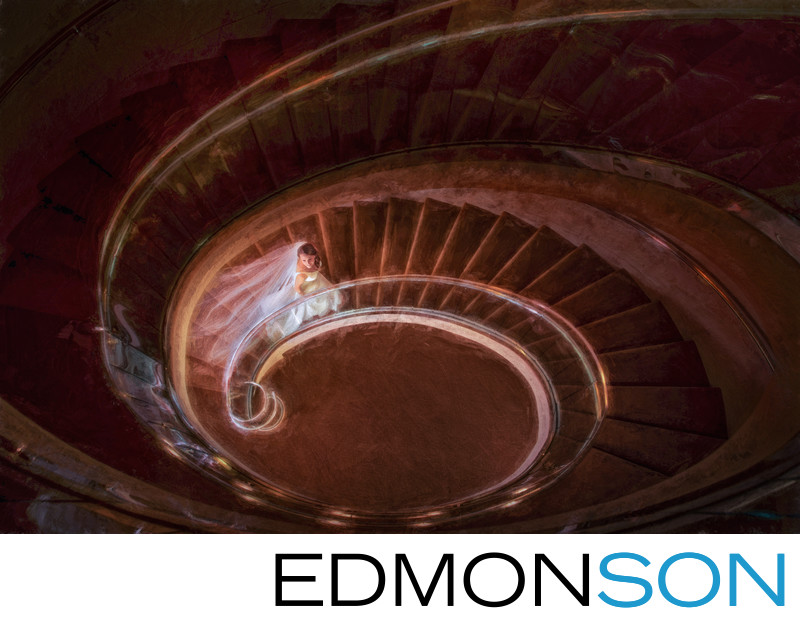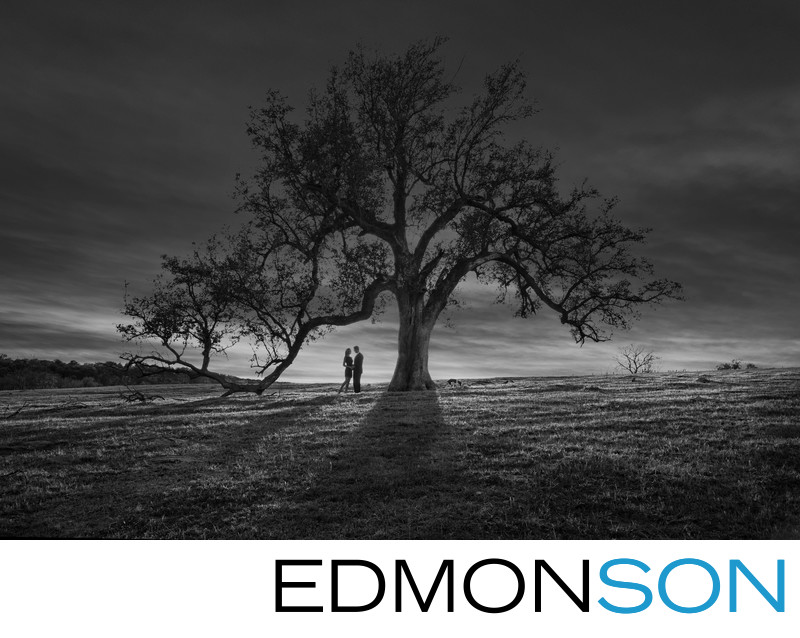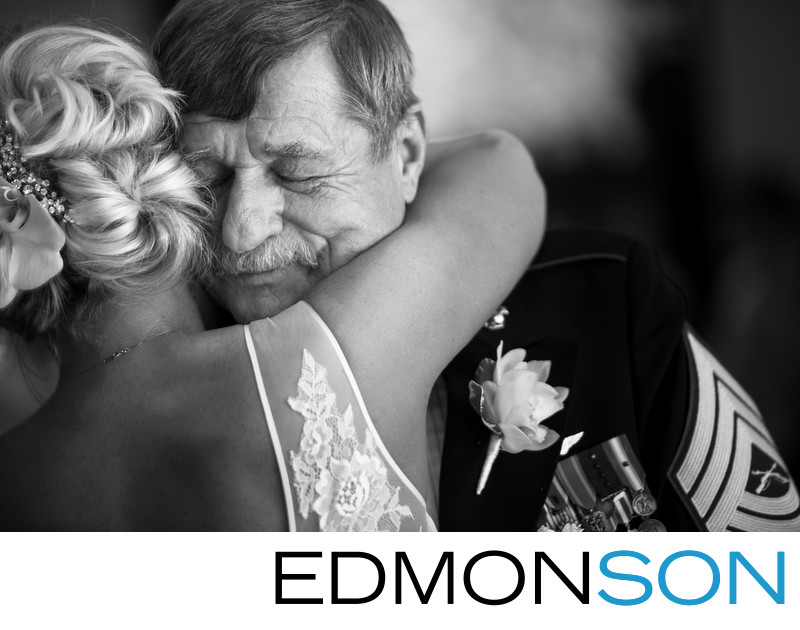10 Questions With A Master Wedding Photographer
Before a major photography convention called ImagingUSA, I was interviewed to provide some insights about my presentation, but also to provide a bit of my personal background for other professional photographers. If you are a Dallas - Ft. Worth bride or groom who is interested in learning more about the maturation of an experienced wedding photographer, dive right in here where I talk about the discovery process we all go through as we mature in life.

The Interview For Professional Photographers Of America (PPA)
A third-generation photographer, Luke Edmonson has the craft in his blood! He's been a professional photographer for nearly 20 years, starting out in commercial photography and then teaming up with his father in 2002 to create Edmonson Weddings. We chatted with Luke about defining a style, his career as a photographer, what inspires him, and much more. Here's a recap of that interview:
Why is finding your style difficult as a photographer?
The biggest difficulty in finding your style is finding your voice and doing the work you need to do to discover who you are and what it is you want to say. It's not simply a matter of a type of photography you like or admire. It's not simply your ability to execute what you want when creating your imagery. You have to know the "Why" behind what you are communicating.
It's about understanding and knowingly pursuing what is behind your vision whenever you are capturing a moment, your subjects and how you light, direct, or pose them. So, an artistic style at its very core requires personal introspection. It is something many of us do not want to do. It requires you to become still be quiet and reflect with intent on who you are as an individual and a creative artist.
I like the quote from Katherine Anne Porter, Pulitzer Prize-winning author, who said succinctly.
"You do not create a style. You work, and develop yourself, and your style is an examination of your own being."Katherine Anne Porter, "An Interview" with Barbara Thompson
Let's examine that idea for a minute.
Don't you create a style?
If not, then what is all the talk about "finding your style" or "creating your style" that you hear bantered about so often? Perhaps it's just marketing “speak” to make it more palpable to the audience listening. Who wants to hear about work when the world sells us on the premise that ( add noun ) is "easy, fast and simple"? But don't for a second betray yourself into thinking that discovering something about yourself is easy. Especially when it involves learning about yourself. What is it that you bring to each photo shoot that shapes the direction of the imagery you just captured?
Should you work and develop yourself?
Yep, it's a never-ending process of growth periods, plateaus, and sometimes darker times. When things get stagnant, it's up to you to make the changes necessary to break through again. When you are on top of the world, it's about fighting complacency. None of us ever have it all fully figured out. However, with all growth and development, some challenges as a photographer that may have taken hours to solve visually can be solved in mere minutes, once you've had that proverbial light-bulb AHA moment.
Your style is an examination based on your own being?
Like most of us, you probably became a photographer when you fell in love with the field. Perhaps, it was because of its immediacy. Perhaps it was because of how it made you feel when people complimented your early eye. But now that you have been in it for a while, what still keeps you in the field? What drives you to create?
When you look back at your work now, what patterns and tendencies do you see? Maturation happens when you transition from WHAT you see, to HOW you are seeing, thinking and feeling, and ultimately discovering the WHY? Are there challenges you've had to overcome and persevere in pursuing photography? Your fingerprint is firmly implanted on every image you create, so I encourage you to study it, consider it, and understand it!
If you want to become a better photographer, that goal starts with becoming a better person. How can you pour out your life for others if there are areas in your own life that are holding you back from doing just that?
2. Define your style in five words.
Beauty, Elegance, Dramatic, Believable, Unexpected.
3. How did you discover your style?
Finding my own style was and still is an ongoing work-in-progress. I can, of course, reflect on different time periods. For instance, when I first started, it was all about energy and getting my subjects excited. My father suggested that would need another tool in my toolbelt because it can't always be about just getting other people going. He was right!
As I grew as a man, husband, and father, it became easier to have intimacy with my clients. Education has also played a huge role in my style because as I grew in posing, lighting and other technical bits and pieces, I became free to spend more time on vision, creativity and helping each subject manage their own “hula hoop”.

What I mean by hula hoop is that in my formative years, if a person was nervous in front of the camera, I wasn't confident enough my own abilities to be able to absorb their nervous energy without it affecting the session. I spent more of my time reacting to clients' expressed needs than listening.
Today, I don't find myself overshooting like I may have done in the past. Typically, before I pick the camera up, I know the reason I'm trying to get a shot, and I have worked on doing a better job communicating that concept to my subjects ahead of time. Once you know Why you are taking a photo, the How and What become simply a matter of preference.
Another area where my style has developed is consistency, be it for tonality, simplified backgrounds, mood, expression or even camera orientation.
A good example would be when shooting wedding details for an album; I no longer shoot vertical and horizontal options at a myriad of different locations. When you put those photographs together on a spread, there can be a disconnect in either the layout or tonality.
By growing further in other areas, I've learned the essence of people who are trying to show their value and that my job is to help them be successful. It's not about being right. It's about meeting their needs and earning their trust and then show and communicate my vision and how it might bring them something unexpected that always delights them.
4. What would you say is usually the most common weakness for a photographer who is just starting out in the business?
Insecurity. Confidence is contagious, and we've all heard the slogan, "fake it until you make it." Wise people know that this phrase, of course, means fake your confidence, not your qualifications. There is no substitute for experience, no workshop, DVD, or online learning opportunity that will help you gain confidence like actually doing something. However, one of the biggest strengths that someone new to the business brings to the task is their passion or excitement.
So my encouragement and advice would be for newcomers to introduce themselves, then connect and start growing with other fellow photographers. Further, when you think you are ready for lessons, find a mentor, attend a workshop, and pursue more education with your whole heart!
5. What was your biggest failure or mistake when you first started?
My greatest failure was in thinking that once I'd achieved a certain level of success all my problems would be over. Momentum is a never-ending process, and everyone whether new and old at doing something has a ball to keeping pushing to keep their business going. Of course, certain things do get easier over time, but the interesting lesson I’ve learned is that as my business grows, so do my problems and often exponentially.
Thus, if you thought that having to edit one or two sessions a month was tough while working a second job, just because you now are focusing solely on photography doesn't mean that editing 10 or 20 session is any easier unless of course you have learned how to manage your time better.
As an entrepreneur, 20% of my day is spent working for my business and 80% of the time is spent working ON my business. Reverse that formula for your employees. And always, please keep your family your priority.

6. What's your biggest accomplishment?
Becoming a husband and father come immediately to mind. It's that whole death to self-thing. Just when I thought I had done a good job growing and making my world well focused on others, along came our daughter. Now there is this beautiful new life that is completely dependent on us.
Nothing is as humbling as marriage to be able to hold a mirror to all the rough edges you might have as a person that never was an issue when you were single. I am thankful for both my lovely wife and our beautiful daughter and the adventures that still lay before us in life!
Success at home is much more important than any professional accomplishment I will ever achieve.
7. Who are some of the artists outside photography from whom you draw inspiration?
That list is a myriad of talent, ranging from Joseph Beuys, Francis Bacon, and Cy Twombly. When I was studying Life Drawing, I had a huge mental hang-up because my drawings weren't very realistic in terms of portraying reality. Twombly was a great example to teach me that writing is a system of mark-making, and if you can write, you can draw. In music, Frank Black, Isaac Brock, and Doug Martsch have been significant influences from the premise of arrangement. The idea of using loud, quiet, and then loud for an effect still resonates with me.
Philosophically, the works of Jacques Derrida and Deconstructionism still permeate within my core and help me photographically distil my work and that of others. Upon reflection, it allows me to understand it from the inside out. Finally, I draw inspiration from my family. It's a family that isn't afraid of failure and disappointment because we've lived through both and still continue to move forward!
8. Why did you decide that photography was the best form of expression for you?
Photography for me was the family business. It wasn't something I decided upon as my preferred form of artistic expression until I matured enough to work with my father. Up until then, I still needed to differentiate myself from him, which is why I got my degree in filmmaking. The fact that my pictures moved and his were still was important to the younger version of me.
At 19, I wanted to explore the artistic world, so the greatest gift my father gave me was permission to venture into it. Photography became the best form of expression for me once I no longer felt like I had to be separate from my father and could work with him instead of trying to accommodate working for him. It became my favorite form of expression when I integrated the truth that we could both use our individual gifts and talents to push ourselves and create something greater than ourselves as individuals. What we create at a team and the memories we make together as Father and Son are priceless. That's when our work and the achievements that have followed started getting special on a personal level.
9. What should people expect to take away from your class?
I think the core of my class, "Be Known By Sight," is that countless photographers are searching for their unique style, looking outside for answers. In this course, I focus on intentionality and discovering your own voice, and learning the value of what you have to say. My goal is to show how you can turn your weaknesses into strengths. That venture is part of the self-discovery that is needed to develop a visual trademark. The process drives how you eventually communicate your uniqueness to others. That's why so many in our industry know when they are looking at an Edmonson print!
10. Elvis, Johnny Cash, or Jack White?
You really want me to choose from three legendary male rock and roll figures who all redefined their musical segments? That's next to impossible. It's not like you asked me to choose Blondie, Digital Underground or the Ramones - three vastly different personas. So my answer is that my record collection includes all three.
If you asked me whether Pepsi or Coke...I could answer that... as they are commodities. If you ask me to choose between 3 legendary musical icons who have shaped entire generations...I’ll say that couldn't imagine the world without any one of their voices in it.
Afterwards
Whether you are a prospective bride or a fellow photographer, I hope you enjoyed this glimpse into the mind of a professional photographer and perhaps also gained a bit more insight into our thinking process. It is much more than just looking through a lens/viewfinder and clicking a shutter.
One of the joys of wedding photography is merging your vision for your day with our creative style. The more we know who we are ourselves, the easier that is to do and the better we can serve you. When you hire us as your wedding photographers, we immediately bring all of our expertise, experience, and vision to bear and together, to equally create and capture your remarkable, once-in-a-lifetime memories.
As wedding photographers, our calling is using our cameras to connect generations by documenting your unique love story.
Copyright 2002-2024 David & Luke Edmonson All Rights Reserved.
All photographs and content appearing on this site are the property of the Edmonson's. They are protected by U.S. Copyright Laws, and are not to be downloaded or reproduced in any way without our written permission. You may share photos using the tools provided in our galleries.
Edmonson Photography is based out the Dallas - Ft. Worth Metroplex, Texas.
Check Availability | 11134 Candlelight Lane, Dallas, TX 75229 | (972) 208-0215